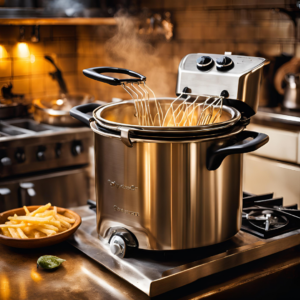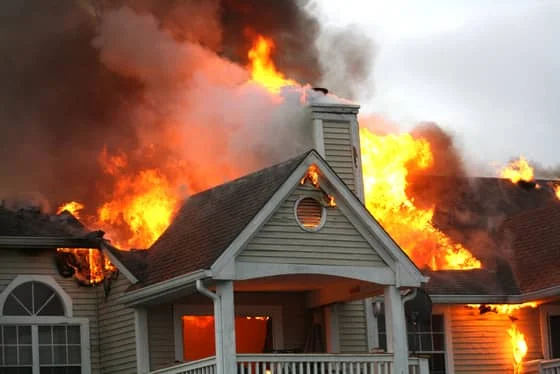Home chefs have a strong appreciation for deep frying due to its skill in creating crispy, visually tempting golden dishes. This cooking method enables the invention of numerous recipes, including fried chicken, French fries, tasty donuts, and tempura. However, it is paramount to be vigilant regarding the substantial dangers associated with deep frying, particularly the potential for a deep fryer fire if safety precautions are not thoroughly implemented. Experiencing such incidents can lead to serious challenges, including the need to address property damage or even situations like selling a fire-damaged house.
Annually, cooking fires in residential areas result in hundreds of injuries and millions of dollars in damages, with deep fryers frequently involved. It is important to stay educated and implement preventive strategies to ensure safety while deep frying. This guide will equip you with the essential precautions to avoid the risk of a deep fryer fire at home.
1. Choosing the Right Deep Fryer
 The foundation of safety in deep frying is established by the selection of appropriate equipment. Since not all fryers are equivalent, choosing one that is equipped with safety features can significantly impact overall safety.
The foundation of safety in deep frying is established by the selection of appropriate equipment. Since not all fryers are equivalent, choosing one that is equipped with safety features can significantly impact overall safety.
- Look for built-in safety features: Deep fryers equipped with automatic shut-off features and temperature regulation lower the risk of oil overheating, a primary factor in grease fires.
- Electric vs. propane fryers: For indoor frying, electric deep fryers are safer than their open-flame propane counterparts, which are ideally used outdoors. Usually, electric fryers incorporate features such as insulated sides to reduce the possibility of burns.
- Check for good working condition: Before each use, inspect your fryer for damaged cords, broken components, or signs of wear. Faulty equipment can be a hidden fire risk.
2. Proper Oil Handling
The type and handling of oil you use can significantly impact your safety when deep frying.
- Choose oils with a high smoke point: Opt for oils like canola, peanut, or sunflower oil that can handle high temperatures without producing harmful fumes.
- Avoid overfilling the fryer: Always follow the manufacturer’s specifications for maximum oil capacity, as excess oil can spill while frying and increase the risk of a deep fryer fire.
- Don’t overuse oil: Reusing cooking oil multiple times leads to a buildup of impurities that lower the smoke point and increase fire risks. Change the oil regularly to keep your fryer safe.
3. Smart Cooking Practices
Practicing mindfulness in the kitchen can dramatically reduce the chance of accidents.
- Never leave the fryer unattended: A moment of distraction can be all it takes for a fire to ignite. Always stay near the fryer while it’s in use.
- Keep kids and pets at a safe distance: Curious little ones and pets can accidentally tip over the fryer, causing dangerous oil spills.
- Monitor oil temperatures: Use a kitchen thermometer to keep oil within the recommended heat range. Overheated oil can ignite spontaneously.
- Avoid frying frozen or moisture-heavy foods: Foods with excess water, such as frozen chicken, cause oil splatter and flare-ups. Always defrost and pat foods dry before frying.
4. Maintaining a Safe Cooking Area
The environment where you deep fry matters as much as how you handle the fryer. Taking the time to prepare your cooking area can minimize the risk of a deep fryer fire.
- Fry in a well-ventilated area: Adequate airflow is necessary to avoid fume accumulation; therefore, it’s important to position your fryer away from flammable materials, including curtains and paper towels.
- Use a stable, heat-resistant surface: Place the fryer on a flat, sturdy surface that won’t tip. Heat-resistant materials provide an extra layer of safety.
- Watch out for cords. Always ensure the fryer’s cords are tucked away safely to avoid accidental tripping or spills.
- Propane fryers belong outdoors. If you’re using a propane fryer, make sure it’s set up far from walls, decks, or buildings to prevent accidents.
5. Emergency Preparedness
Despite implementing the most effective safety measures, it is essential to prepare for unforeseen events. Fires originating from deep fryers can intensify rapidly; however, being informed about the appropriate response can help contain them.
- Never use water on a grease fire. Water reacts explosively with hot oil and will only worsen the flames. Instead, smother a grease fire using the proper tools.
- Keep a Class K or B fire extinguisher nearby. These extinguishers are specifically designed to combat grease fires. Make sure all household members know how to use one.
- Use baking soda for small fires. For minor flare-ups, smother the fire with baking soda—never flour or sugar, which can make the fire worse.
- Turn off heat sources. If a fire occurs, immediately shut off the fryer or the stovetop burner, if applicable.
6. Cleaning and Maintenance for Safety
Ensuring a fryer is clean contributes to its safety. Regular maintenance and cleaning practices prevent the accumulation of oil residues that might ignite.
- Clean your fryer after each use. Remove built-up grease and food particles that could catch fire later.
- Inspect propane fryers. If you’re using a propane fryer, frequently check for leaks or damage and make any necessary repairs promptly.
- Follow the manufacturer’s manual. Each fryer model has specific cleaning and safety guidelines—don’t skip the manual.
7. Safety During Seasonal Cooking
Deep frying takes center stage during certain holiday traditions, such as cooking a juicy Thanksgiving turkey. Seasonal cooking requires extra caution due to the heightened risks and larger cooking setups.
- Deep-frying a turkey? Plan ahead. Use a fryer that matches the size of the bird, and take special care not to overfill with oil once the turkey is submerged.
- Cook outdoors. Move your fryer to an open, outdoor location far from trees, walls, or flammable structures.
- Stay vigilant. With more people and distractions around during the holidays, it’s essential to stay extra focused while frying.
Your Safe Deep Frying Checklist
Before you heat up your oil, here’s a quick checklist to keep safety top of mind:
- ✅ Use a fryer with safety features like temperature controls.
- ✅ Choose oils with high smoke points and avoid overfilling.
- ✅ Keep children and pets out of the kitchen while frying.
- ✅ Always monitor oil temperatures and fry in a safe environment.
- ✅ Have a fire extinguisher or baking soda ready for emergencies.
- ✅ Regularly clean your fryer and inspect for any damage.
Cook Deliciously, Cook Safely
Engaging in deep frying at home need not be a cause for concern. By implementing these valuable safety recommendations, you can indulge in your cherished fried delicacies while ensuring that your cooking activities remain safe and efficient. It is vital to understand that prioritizing safety should become a consistent practice, fostering both delightful culinary experiences and tranquility.
Now go fire up that fryer! But first, share these tips with your fellow home chefs to make every kitchen safer.

